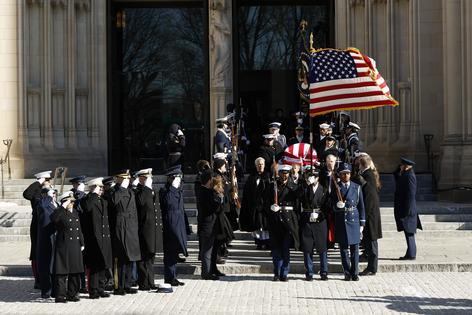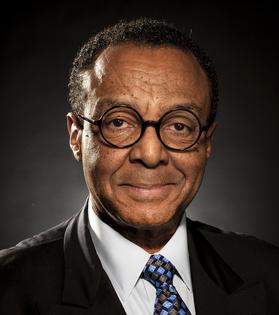Jimmy Carter’s Funeral Brought a Rare and Much-Needed Vision of Peace
When he showed up at the Chicago Tribune one day in early 1976, James Earl Carter, Jr., was announced by one of our young newsroom copy clerks as “that governor from Georgia who thinks he can run for president.”
Yes, as a young reporter in that newsroom, I remember Jimmy Carter as a former peanut farmer from Plains, Georgia, and a former Navy nuclear submariner with a 100-watt smile and high ambitions.
Jimmy Carter was on his marathon quest for national recognition as he built a campaign that truly came from the grassroots at a time when a successful presidential run by a southerner had not succeeded since Lyndon B. Johnson, a Texas Democrat.
Nearly a half-century on, at his funeral in Washington National Cathedral on Thursday, the former president, who died at age 100, was remembered by fellow Georgia Democrat Andrew Young as a man of “character” and “something of a miracle” with “prophetic” vision.
"Jimmy Carter was a blessing that helped to create a great United States of America,” said Young, a veteran civil rights leader and congressman whom Carter appointed ambassador to the United Nations.
Jason Carter, the former president's grandson, stated in his eulogy: “His political life and his presidency, for me, was not just ahead of its time — it was prophetic. He had the courage and strength to stick to his principles, even when they were politically unpopular.
"As governor of Georgia half a century ago, he preached an end to racial discrimination and an end to mass incarceration. As president in the 1970s, as you’ve heard, he protected more land than any other president in history. Fifty years ago, he was a climate warrior who pushed for a world where we conserved energy, limited emissions and traded our reliance on fossil fuels for expanded renewable sources.”
And that’s just a pinch of Carter’s century-long life of achievements and, occasionally, high-profile setbacks. It was a century that he filled with honors, achievement and controversies, which added up to what many — including me — call the best ex-presidency In this nation’s history.
I remember him most for advancing the causes of peace, civil rights and aid to the underprivileged — to “the least of these,” as the Book of Matthew puts it.
Carter's impulse to heal and seek peace was evident on his second day in office, when he pardoned all who had left the country to evade the Vietnam War draft. He went on to conclude the historic Camp David Accords and a later treaty bringing peace and establishing diplomatic relations between Israel and Egypt.
He also concluded treaties transferring sovereignty of the Panama Canal and advanced the Strategic Arms Limitation Talks with the USSR.
Yet Carter's presidency was largely undone by the Iranian Revolution and its economic knock-on effects. Carter had continued the longstanding U.S. support of the Shah of Iran, which earned America the moniker "Great Satan" among the Islamist revolutionaries who overthrew the Shah in 1979. In November of that year, Iranian students stormed the U.S. embassy in Teheran and held its personnel captive, not releasing them until minutes after Ronald Reagan was sworn in as Carter's successor.
The hostage crisis severely weakened Carter, especially after a rescue effort by elite U.S. military forces failed, leading to the deaths of eight servicemen. The Iranian Revolution also led to an oil crisis that caused long lines at gas stations in the U.S., spiked inflation and produced a record-high in the "misery index," an economic measure that adds the inflation rate to the unemployment rate.
Hobbled by these events, Carter suffered a landslide defeat to the Republican ticket of Ronald Reagan and George H.W. Bush in 1980.
Not surprisingly, historians and the public generally rate Carter’s presidency below average. Yet Carter’s post-presidency — the longest in history — stands out for most Americans as a model of modest and selfless public service.
That reversal came without much fanfare as he mounted his own efforts including the Carter Center to promote human rights, fight diseases and provide election observers to promote democracy and peace negotiations in trouble spots around the world. His work through the Carter Center was recognized with the Nobel Peace Prize in 2002.
Carter wrote numerous books, including two about the Israeli-Palestinian conflicts, and may be best known for volunteering with his wife, Rosalynn Carter, to help build houses for the poor with the nonprofit Habitat for Humanity, satisfying what he described as a lifelong interest in woodworking.
His point, well-taken, is that everyone can do something to help improve the world of low-income Americans, and Jimmy Carter showed a profound eagerness to do that as often as possible.
And through it all, he persistently found time to teach Sunday school at his family's church in Plains, making it one of the South’s more unusual and widely beloved tourist attractions.
Appropriately, his funeral offered a visible example of how our fractious and often cynical political establishment can be brought together in tribute to a genuine servant of charity and peace.
Three days after the anniversary of the Jan. 6 insurrection at the U.S. Capitol, no zip ties, bear spray or costume hats were to be seen. Instead, we saw all five living presidents happily seated together, while we observers speculated as to what Republican President-elect Donald Trump and Democratic former President Barack Obama were joking about with each other. Peace at last?
"Time and again, I saw in him the ability to achieve diversity by the personality and upbringing,” Young said of Carter. “He went out of his way to embrace those of us who grew up in all kinds of conflict.”
Perhaps that spirit of goodwill is contagious — even in Washington. We can only hope.
========
(E-mail Clarence Page at cpage47@gmail.com.)
©2025 Tribune Content Agency. Distributed by Tribune Content Agency, LLC.
(c) 2025 CLARENCE PAGE DISTRIBUTED BY TRIBUNE MEDIA SERVICES, INC.



























Comments